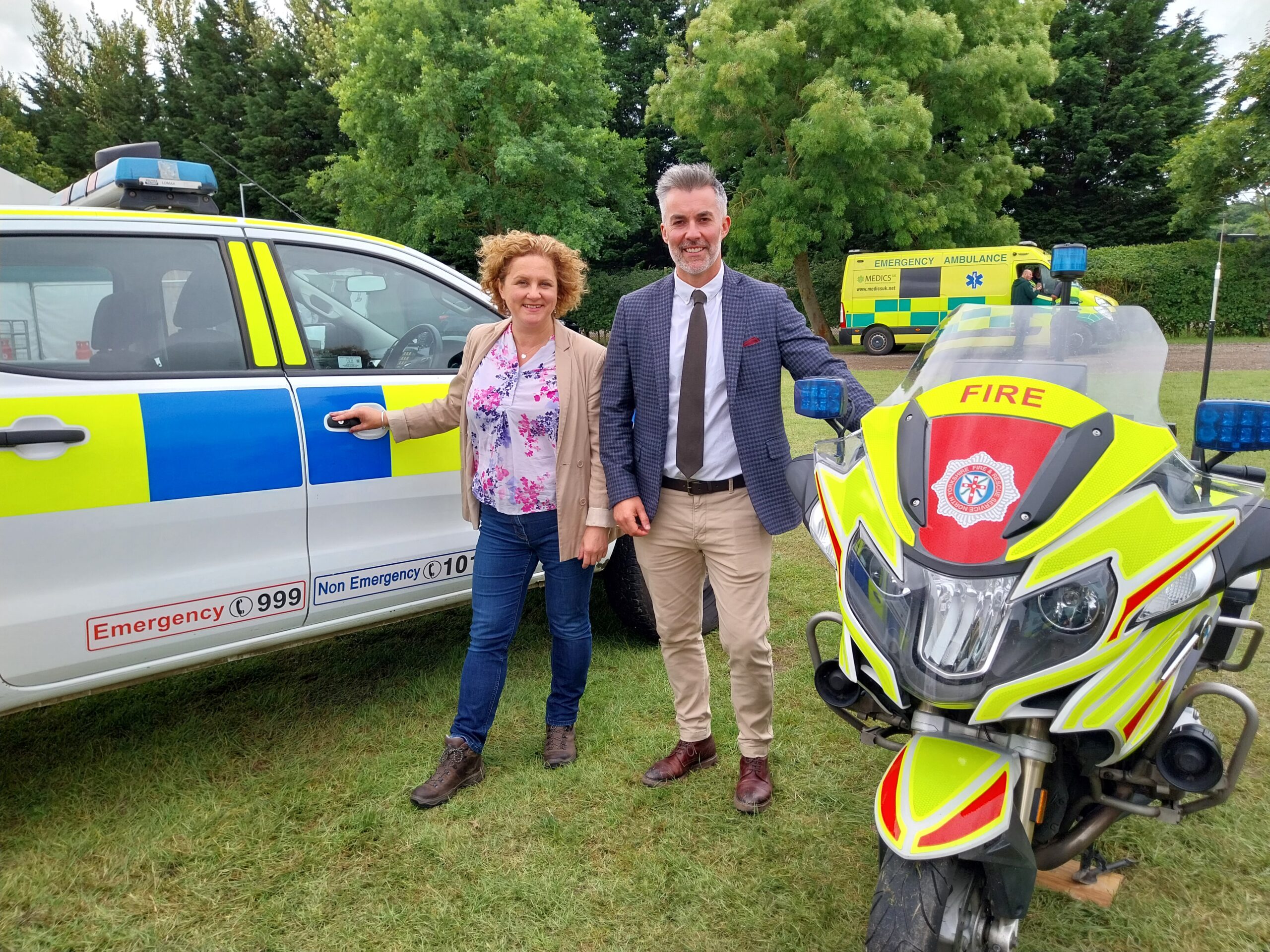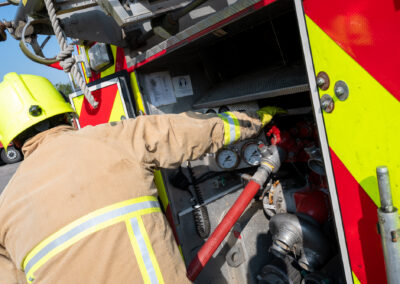David Skaith, the Mayor for York and North Yorkshire, is asking for your views before setting the amount that goes to North Yorkshire Police and, separately, to North Yorkshire Fire and Rescue Service from your council tax bill. This is known as a precept.
The principles on which the Mayor will make his final decision are:
- The minimum possible burden on local taxpayers
- Having effective, well managed public services that keep people safe and deliver value for money
- Delivering on local public priorities for both services, including improving the safety of our roads
The consultation offers several options, ranging from the level of funding needed to maintain current services, to options that which would allow further investment in priorities. These priorities include neighbourhood policing, prevention and early intervention for both services, as well as improvements to fire stations, vehicles, systems and equipment to enhance service delivery and firefighter safety.
The Mayor and Jo Coles, Deputy Mayor for Policing, Fire and Crime, are also proposing increased investment to make our roads safer, to help reduce collisions and casualties to achieve Vision Zero – the ambition for zero deaths on York and North Yorkshire’s roads.
Before setting the levels of precept for the two services, the Mayor would like to know your views on the possible options. When an option might impact on service to the public that is made clear.
- The survey should take no longer than 7 minutes to complete
- The survey will close at 10am on Monday 5 January 2026.
Information should be accessible for all. If you require this information in a different language or format, please contact the Policing, Fire and Crime Team at info@northyorkshire-pfcc.gov.uk or call us on 01423 569 562 to request a copy.
Our privacy notice about how we use and protect your data can be found here: Personal privacy notice
Funding for North Yorkshire Police
North Yorkshire Police currently has a budget of £232 million. Around £104 million of this (45 per cent) comes from your council tax and the other 55 perc ent mainly comes from the Government.
North Yorkshire Police has worked hard to increase the efficiency of how it delivers its services to ensure the public get value for money. To maintain the current level of service, the police need an extra £12 million to cover inflation and other ongoing costs. About £4.5 million of this would need to be raised through the council tax, with the remainder delivered from savings and increases in Government funding.
The Government is likely to set a national limit allowing a council tax increase of up to £14 towards policing for an average Band D property. Each £1 raises approximately £325,000. The £14 increase would raise about £4.5 million for policing.
The following options are based on the amount of council tax an average Band D property would pay for policing. This is currently £306.86 per year.
How much more do you think it is reasonable to pay each year for policing in York and North Yorkshire?
Up to £12 a year (£1 per month)
- Raises around £3.9 million
- Below the organisation’s inflationary pressures
- Would likely lead to reductions in current levels of service delivery unless significant further savings could be delivered
Up to £14 a year (£1.17 per month)
- Raises around £4.5 million
- Matches the organisation’s inflationary pressures
- Maintains current levels of service delivery
Up to £16 a year (£1.33 per month)
- Raises around £5.2 million
- Likely to be higher than the organisation’s inflationary pressures
- Allows some investment. For example, in neighbourhood policing, early intervention and prevention activities and tackling violence against women and girls.
Up to £18 a year (1.50 per month)
- Raises around £5.9 million
- Higher than the organisation’s inflationary pressures
- Allows more significant investment. For example, in neighbourhood policing, early intervention and prevention activities, and tackling violence against women and girls.
Funding for North Yorkshire Fire and Rescue Service
North Yorkshire Fire and Rescue Service has an annual budget of £51.6 million. Around £35 million of this (67 per cent), comes from your council tax and the remaining 33 per cent is funded mainly by the Government and Business Rates.
Last year’s council tax increase provided much needed financially stability and allowed for important investment in York and North Yorkshire Fire and Rescue Service. The Mayor would like to see this work continue and to invest in road safety in line with agreed public priorities.
In 2026-27 it is estimated £3-4.5 million more is needed to maintain current service levels and deliver planned improvements, depending on the final funding formula which determines the level of Government funding we receive. £2-3 million of this would need to come from council tax, with the rest from savings and increased Government funding.
Each £1 raises approximately £325,000 . An increase of £6 for a Band D property would raise about £2 million.
The following options are based on the amount of council tax an average Band D property would pay for fire and rescue services. This is currently £107.02 per year.
The options show the maximum increase you might pay. The Mayor will reduce these amounts in line with the level of funding received from Government.
How much more do you think it is reasonable to pay each year for fire and rescue services in York and North Yorkshire?
Up to £6 a year (50 pence per month)
- Raises around £2 million
- Any changes to the current funding formula will risk current levels of service delivery and the financial security of the service, and reduce future capital investments
- No scope for additional service investment
Up to £8 a year (67 pence per month)
- Raises around £2.6 million
- May allow limited investment in road safety if no changes to the funding formula
- Any changes to the current funding formula will result in increases in debt and reduce future capital investments
Up to £10 a year (83 pence per month)
- Raises around £3.3 million
- Allows for investment in road safety
- Minimises impact of significant changes to the current funding formula
- Maintain current levels of service delivery and the financial security of the service
Up to £12 a year (£1 per month)
- Raises around £3.9 million
- Allows for investment in road safety
- Minimises impact of significant changes to the current funding formula
- Allows limited investment in other areas of service delivery. For example, in operational training and equipment.
Precept Survey 2026/2027 FAQs
What are police and fire precepts?
The police and fire precepts are the amounts dedicated to policing and fire and rescue services in North Yorkshire and York from every household in their council tax bill.
Why is the Mayor setting the precept and not the Police, Fire and Crime Commissioner?
Prior to May 2024, the Police, Fire and Crime Commissioner (PFCC) was responsible for setting; the policing precept (the portion of the council tax to fund local police services) and the fire and rescue precept (the portion of council tax to fund fire and rescue services).
In May 2024, the Mayor for York and North Yorkshire was elected to lead the York and North Yorkshire Combined Authority, resulting in the dissolution of the PFCC. The Fire and Rescue Authority became part of the Combined Authority. Consequently, a Mayoral General Precept will be introduced, forming part of the overall council tax to fund services under the Mayor’s jurisdiction. Fire and Rescue will now be included in the Mayoral General Precept rather than being a standalone precept.
Why are you asking for the public’s opinion?
The Mayor is legally responsible for setting both the policing precept and the Mayoral General Precept, which now includes the fire and rescue element. The Government sets national referendum principles that limit council tax increases before a referendum is required. These principles apply to the Mayor’s policing precept but not to the Mayoral General Precept.
To set the policing precept, the Mayor must consider the views of council tax payers across York and North Yorkshire. While consultation on the Mayoral General Precept is not legally required, it is generally advisable to ensure transparency, accountability, and public engagement in decisions affecting local taxation and public services.











